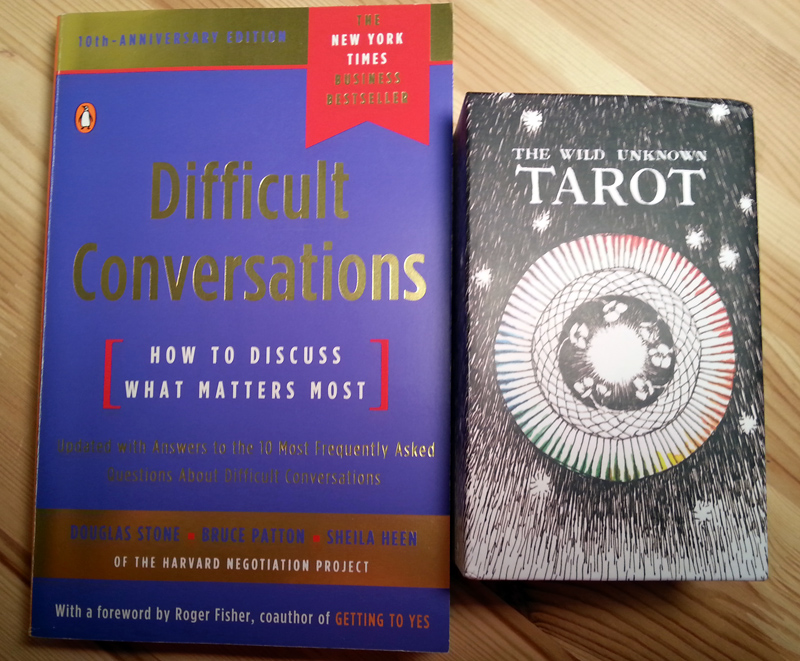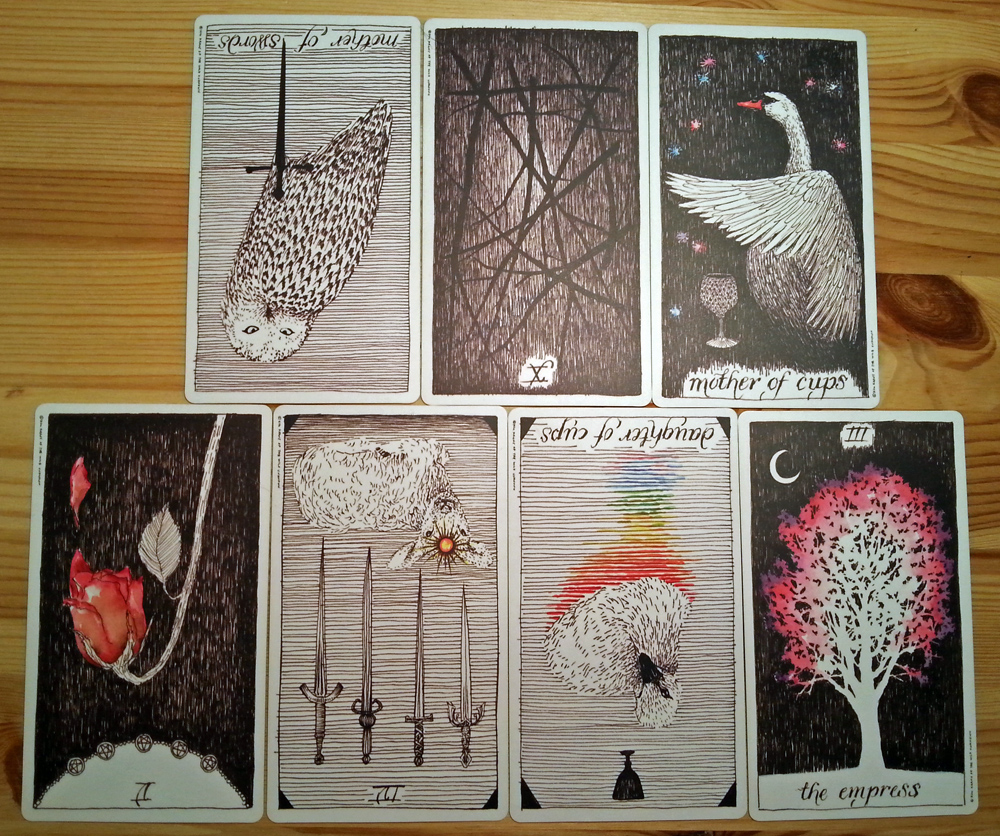 Difficult Conversations: How to Discuss What Matters Most by Douglas Stone, Bruce Patton, and Sheila Heen, is a book I’d recommend to anyone. My copy has a thing on the front that says “New York Times Business Bestseller” and it’s categorized in “Psychology/Business” on the back, but I’m glad I didn’t let the association with business culture get in the way of reading this book, because it’s truly applicable from the most professional situation to the most personal one.
Difficult Conversations: How to Discuss What Matters Most by Douglas Stone, Bruce Patton, and Sheila Heen, is a book I’d recommend to anyone. My copy has a thing on the front that says “New York Times Business Bestseller” and it’s categorized in “Psychology/Business” on the back, but I’m glad I didn’t let the association with business culture get in the way of reading this book, because it’s truly applicable from the most professional situation to the most personal one.
The authors’ argument is that difficult conversations–those that are difficult to broach or that trigger us emotionally–have three layers to them: the facts, the feelings, and the identity. If someone leaves a comment on my blog saying, “This post was poorly written,” three things are going on: the post itself (the fact), how I feel about being criticized (how I feel), and what part of my identity is being threatened by the criticism. If I am clinging to an identity of being a good writer or a smart person, I may feel defensive or angry–or I may do the opposite and give into despair: “I’m not a good writer after all.” I may respond by arguing about the facts–“This IS a good post, you just didn’t read it carefully!”–when what’s really important, and what are motivating 99% of my response to the comment, are my feelings and threatened sense of identity.
Now imagine a situation where it’s more complex: firing someone, breaking up with someone, telling a tenant that you’re selling the property and they’ll need to move, telling your parents you were sexually abused by a relative 20 years after it happened. Feelings and “identity-quakes” are going to be flying around and this book gives much great advice on handling them.
In preparing for a difficult conversation, tarot can help us, too, because it provides what we–who are so often identified with our identities and who act from our feelings–need: perspective. They get us out of the temporary feelings and thoughts of the moment and give us a space to see what we might be missing otherwise.
I mean, in approaching a difficult conversation you could just ask “what should I say?” and pull three cards, but working with an advanced model for how to think about this will make the tarot spread all the more effective.
The Spread
1. What happened: the facts of the situation. This is important because, as we all know but tend to forget when we’re reacting strongly to a situation, is that every story has at least two sides. Don’t assume that your story is the only story or that you know what the story even is. (An argument about, say, carpet vs. hardwood floors could really, in fact, be an argument in which one person is trying to get the other person to demonstrate commitment, while the other person has no clue about this and simply doesn’t have a preference for either carpet or hardwood floors!)
2. How do I feel about this situation? Seems like a stupid question to ask the tarot, but I find it to be one of the most illuminating. Sometimes the answer is not what you expect, but even when it is, it’s wonderful to see your feelings mirrored in the cards.
3. What identity or sense of self is being threatened, challenged, or changed by this situation? This is the big one. We carry around so many identities without even knowing it, and defend them not even knowing what we are doing. If someone says that I said something racist, I may argue with them about whether or not it’s a racist phrase or that it wasn’t racist because I didn’t intend to use it that way. I may go ballistic, research the history of the use of the phrase/word, or just shut that person out of my life. But what I didn’t know was that my entire response was motivated by feeling that my identity as a good person was threatened.
4. What is my goal in having this conversation? In Difficult Conversations, the authors ask you to think about this. What exactly is the goal? To tell the other person that they’re wrong or chew them out? To express your feelings? To come to an understanding? Before you even begin a conversation, it’s important to know what your motives are–because sometimes the conversation isn’t even worth having in the first place if all you want to do is chew someone out or complain to them about a situation that can’t be fixed.
5. What really needs to be said? Here we’re at the meat of it. What do you really need to say? What is your truth?
6. What is true but doesn’t need to be said? Telling a person that you want to break up with them because you don’t feel emotionally compatible is legit. Also telling them that you think their art is shitty is unnecessary. Sometimes things are true, but that doesn’t meant they need to be said.
7. What is the most important thing to keep in mind? I think of this as much of a how question as a what question. Think of this card as the lighthouse beacon for when the conversation begins to get off track. Sometimes this card will match up with #4–your goal. Sometimes it will be at odds with your goal, in which case you may need to reevaluate your purpose in having this conversation in the first place. You could even use this card as a talisman–bring it to the conversation or wear or carry something that reminds you of it.

Here is a sample of this spread that I did recently. I got into an argument with a friend based on issues we’ve had before and now feel that I need to go back and talk about things. I won’t go into the details, but I’ll briefly run through each card.
- What happened? Mother of Swords, RX. I lost my temper, let my emotions get in the way of the facts. I was projecting my identity onto the situation.
- How do I feel? 10 of Wands, RX. Hell yes. Burnt out, exhausted, tired of having the same argument over and over.
- What part of my identity is being challenged? Mother of Cups. This one is funny because both the Mother of Cups and the Daughter of Cups are my significators. My sense of myself as a patient, compassionate person is being challenged.
- What is my goal in having this conversation? Five of Pentacles, RX. To undo pain and feelings of misunderstanding/isolation.
- What needs to be said? Four of Swords, RX. Some things that should have been said a long time ago, but weren’t. I need to stop covering things over and tell them my truth. These things need to be actionable.
- What is true that doesn’t need to be said? Daughter of Cups, RX. I don’t need to bring all my emotional immaturities upfront. I don’t need to go over in detail every time I was annoyed or upset. This is not about emotional venting.
- What is the most important thing to keep in mind? The Empress. That my goal is healing and I have it within me to do this.
Wow! I was very impressed with these when I turned them over. So much clarity here.
If you feel moved to use this spread, please comment and tell me how it went! And also consider picking up a copy of Difficult Conversations if you have some especially difficult conversations you need to have, or you have to have these kinds of conversations fairly often.*
_____________
* I bought this book with my own money and am recommending it based on my own experience.
Leave a Reply